Uninterruptible power supply systems for a gas boiler - types, types and features of choice.
Autonomous boilers heating systems, even if they run on natural gas, become useless without electricity. The current is needed both for the automation of the control system and for the circulation pump. But it requires the shape of the correct sinusoid and stable characteristics, otherwise these devices may simply cease to function. To do this, a UPS is built into the general heating circuit of a private house - an uninterruptible power supply capable of simultaneously performing the functions of an electric current stabilizer.
Source uninterruptible power supply for heating, passing through itself the mains voltage, converts it into a “correct” flow with stable characteristics. For gas heating boilers, you need to choose single-phase UPS. They provide current to the equipment control unit and the circulation pump, which causes the coolant to actively flow through the circuit. When the power supply is turned off in a private house, the same UPSs use the built-in batteries. They will allow the boiler to continue operating normally for several more hours.
Varieties
UPS for autonomous heating are distinguished by the principle of operation. Structurally, there are three types of such stabilizers:
1. Electromechanical.
A device with current-collecting brushes, operating on the principle of a conventional rheostat. When the voltage rises / falls, the installed drive shifts the graphite brushes or simply opens the circuit if the load jumps to 260 V. Next is the transformer, which brings the current characteristics back to normal. The advantages of an electromechanical UPS are smooth current conversion in a wide range (140-260 V). The disadvantages include the fragility of graphite current collectors and insufficient response speed, to which some heating boilers react disapprovingly.

2. Relay converters.
Although these UPSs do not provide the same high output regulation accuracy (5% deviation versus 2% for electromechanics), they work much faster. Such uninterruptible power supplies normally tolerate overloads, which often occur if you have a private house somewhere outside the city.
3. Thyristor.
They work on semiconductor SCR valves, which allows them to quickly respond to the slightest changes in the input stream: amplify it if necessary or straighten it. These are the most reliable and durable UPS for gas boilers.
If you have installed in a private house heating system, you simply cannot do without a reliable stabilizer. With constant interruptions in light, you will be left without heat with the same regularity. Problems will also arise in the event of power surges - modern automation is very capricious and the gas boiler can simply fail.
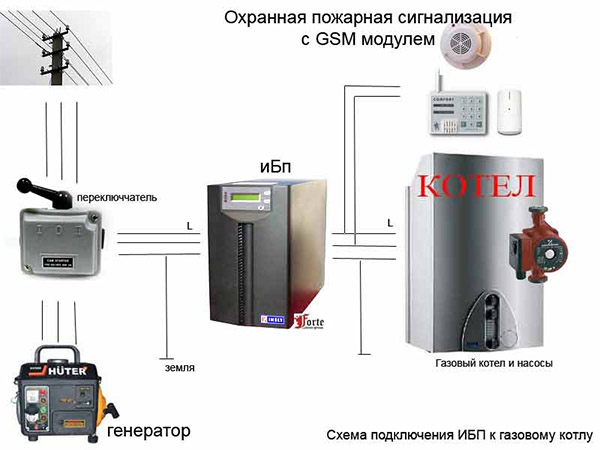
How the UPS works
So that conventional stabilizers and rectifiers can also supply it uninterruptedly with a complete blackout, they provide built-in batteries. While the heating is powered by the network, they accumulate a charge to feed the gas boiler when the need arises.
You can choose from three fundamentally different battery UPS designs.
1. Transit (Teplocom, Phantom).
A simple and affordable redundant system that distributes the input stream to the charger and inverter during mains operation. When the supply is turned off or the voltage drops below 175-180 V, the circuit switches to batteries within 4-12 ms. Imported heating boilers can sometimes “feel” this, simpler models do not.
2. Double conversion UPS (Calm, Vexillum).
In this scheme electricity first it turns into a constant, getting into the rectifier of the device, and only then it is divided into two branches. One charges the batteries, and the second is sent to the inverter, where D.C. becomes variable again and feeds the heating elements. Such a system stabilizes the voltage (U) and frequency of electricity supplied to the gas boiler, therefore it is considered one of the best.
In the event of a mains blackout or voltage out of the range of 170-270 V, the supply to the inverter is guaranteed by the permanently connected UPS batteries. Such a transition occurs instantly and remains "imperceptible" to the system. Built-in batteries provide normal power supply to any heating boilers for 8-10 hours. The disadvantage is lower efficiency and heating of the equipment. However, the second disadvantage is eliminated by cooling fans.
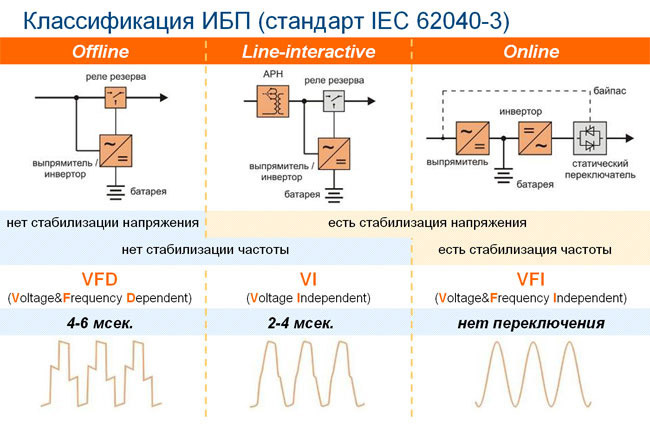
3. Line interactive (Resanta).
Such UPSs are not able to completely convert the voltage supplied to the boilers, but only slightly smooth out its sinusoid - by 20 percent. The flow is supplied to automatic switches from the external network through a transformer, and in an emergency - from batteries. At the same time, the speed of putting the batteries into operation is minimal (2-4 milliseconds). Interactive UPSs can have two types of output stream: pulsed or sine wave. A second one should be installed on heating boilers.
Criterias of choice
Since uninterruptible power supplies come with various types of built-in batteries, you also need to be able to choose the right batteries. Moreover, their cost is about 80% of the price of the entire set of supply equipment.

On UPS for boilers, it is better to buy batteries with liquid or gel electrolyte. Both of them have approximately the same service life (about 12 years), are protected from leakage and are allowed for installation in residential premises (private house, apartment). Although they do have a difference:
- AGM - batteries in which a porous fiberglass mat is impregnated with a liquid electrolyte. They have low resistance, so the charge accumulates faster. However, due to the small amount of catalyst, AGMs are very sensitive to an increase in input voltage.
- Gel - in such batteries, the electrolyte is “bound”, due to which it does not evaporate during the discharge process. However, a 1% change in the charging voltage causes active gas formation and may even lead to an explosion.
![]()
To choose a reliable UPS for heating, you should also pay attention to nameplate power charger. It should relate to the battery capacity approximately as 1 to 10. Minor deviations can be ignored. The uninterruptible power supply itself is better to choose a design that provides for the connection of additional batteries (LT class), even if the capacity of the built-in batteries seems sufficient. They will allow you to maintain the functioning of the system for a very long time without voltage. Especially powerful UPSs are required for branched circuits, where heating boilers also work for hot water supply.
The next step is to select the speed of switching to standby power (depending on the implemented scheme) and maximum time battery discharge. According to the first parameter, double-conversion or linear-interactive uninterruptibles for heating are preferable. And the duration of the batteries will depend on their capacity and the power consumed by the gas boiler:
- 75 Ah - can continuously power equipment up to 100 W for 7.5 hours and only an hour and a half if the load is 500 W;
- 100 Ah - from 2 to 10 hours of continuous operation in the same range of power consumption;
- 150 Ah - designed for 3-15 hours.
It also makes sense to choose an uninterruptible power supply for heating with the maximum voltage range of the received stream without turning on the batteries. The built-in battery protection prevents them from being completely discharged. After all, planted "to zero" they will either lose heavily in capacity, or completely fail.
At the beginning of our review, we already mentioned that heating boilers and related automation need current with the correct, that is, “clean” sinusoid. This is how it should be written in the data sheet for the UPS. Equipment that outputs a modified sine waveform is not suitable for this application.
Before choosing an uninterruptible power supply for the boiler, it is necessary to determine the energy consumption of all heating equipment connected to it with a minimum error. This is necessary in order to buy a UPS with 5, or better, a 7-fold margin in terms of starting power and two-fold in terms of nominal power.
Price
What should be a UPS for gas boilers and have perfect protection against low-quality electrical networks? When is it advantageous to use a UPS for heating boilers? Imagine what it feels like to know that the heating in your house will work without interruption, and low-quality electrical voltage will not harm your heating boiler, which will keep the house warm during the long winter evenings.
UPS on line for boilers
An uninterruptible power supply for a gas boiler should not care what voltage is at the input; at the output, it always produces voltage without distortion thanks to online (On Line) technology. Online UPS for the boiler stabilizes the power grid from interference and surges, and double conversion technology ensures uninterrupted power. Online UPS for gas boilers will provide protection for heating equipment and comfort in use.
UPS for gas boilers is beneficial to use when you want to connect only heating system and, for example, several household appliances. With this configuration, the battery life of the UPS for the heating boiler can reach several days. The stabilizer will only protect against power surges, but will not be able to provide continuous power to the boiler. The generator is not always convenient, even if fully automated, if only in that it needs to be filled with fuel, which emits smell and creates dirt, it can make noise and vibrate. And if you have important business, you need to take care of who will monitor the generator.
The online UPS for the boiler, previously listed, has no problems, you can put it in the house and forget about it before the battery life expires. Batteries are sealed and maintenance-free, they do not contain any fumes, are fireproof and can be installed in residential areas. Work in any position. Do not confuse with automobiles.
Choosing a UPS for a boiler
How to choose a UPS for a boiler? Now that we know that online UPS for gas boilers is suitable for us, we need to find out:
- For what time of autonomous operation will we select batteries for the UPS?
- what equipment will power the UPS on line for boilers?
- What is the total total power in “W” of the equipment?
It should be noted that on UPS for gas boilers prices Batteries make a big difference. Therefore, the backup time of the UPS for heating boilers is calculated based on the frequency and duration of voltage problems in the network.
Modern gas boilers are good because, under normal operating conditions, they work completely autonomously. Human intervention is usually required only to adjust the parameters. But for stable operation, they need a certain pressure and quality of gas, as well as high-quality and constant power supply. The last task is handled by an uninterruptible power supply for a gas boiler. Their choice and parameters will be discussed.
What is a UPS for?
In our country in winter time heating is indispensable. Moreover, heating is desirable without failures and stops - in severe frosts, the system can be defrosted. When organizing the system, it must be remembered that most modern boilers are controlled by automation, and the movement in the system is provided by circulation pumps. All of this equipment is powered by electricity.
Given that power outages are not uncommon in winter, additional measures must be taken to create a redundant power supply. In most cases, they install a UPS - an uninterruptible power supply. Its task is to supply power from batteries in the event of a power outage or “sag” in the network.
Features of choice for gas boilers
An uninterruptible power supply for a gas boiler must be selected in such a way that it supplies voltage of the correct form - as close as possible to an ideal sinusoid. In this case, phase synchronization of the sinusoid is also important.
All of these requirements are necessary to ensure normal operation control unit. In most imported gas boilers, automation is assembled on the basis of electronics, and it is demanding on the quality of the power supply. To assess how important this requirement is, it is worth saying that, according to the statistics of service centers, about 40-55% of gas boiler breakdowns are associated with the failure of the control board. At the same time, boards are almost never repaired. They simply need to be replaced.
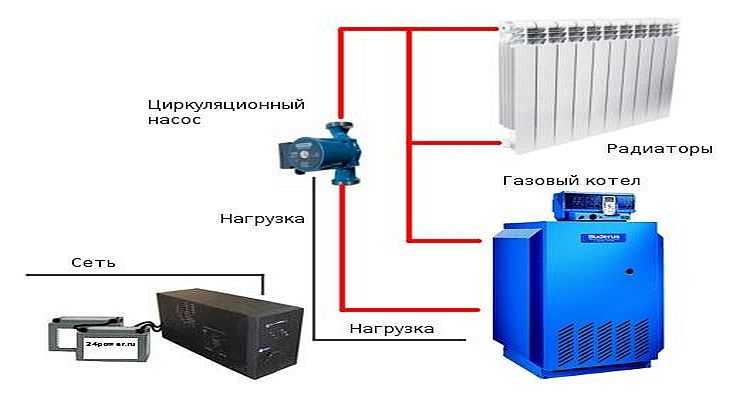
It is also worth remembering that the failure of the control board due to unstable power is a non-warranty case (almost all manufacturers). So the cost of the board and its replacement has to be paid out of your own pocket. Moreover, many boards are delivered "on order", and this is a few weeks of waiting. How to heat the house at this time is an interesting question ... If you also remember that the cost of the board is about 40-50% of the cost of the unit, you involuntarily think about purchasing a high-quality and reliable uninterruptible power supply for a gas boiler.
The good news is that you can “drive” the rest of the equipment that requires high-quality and guaranteed power supply to one UPS of sufficient power, or you just want to ensure its uninterrupted operation. Most often, these are computers, televisions and a couple of emergency lighting bulbs.
Types of uninterruptible devices
Today, the distribution network offers three types of UPS:
- off-line (on-line);
- on-line (off-line);
- Line-Interactive (line-interactive whether line-interactive).
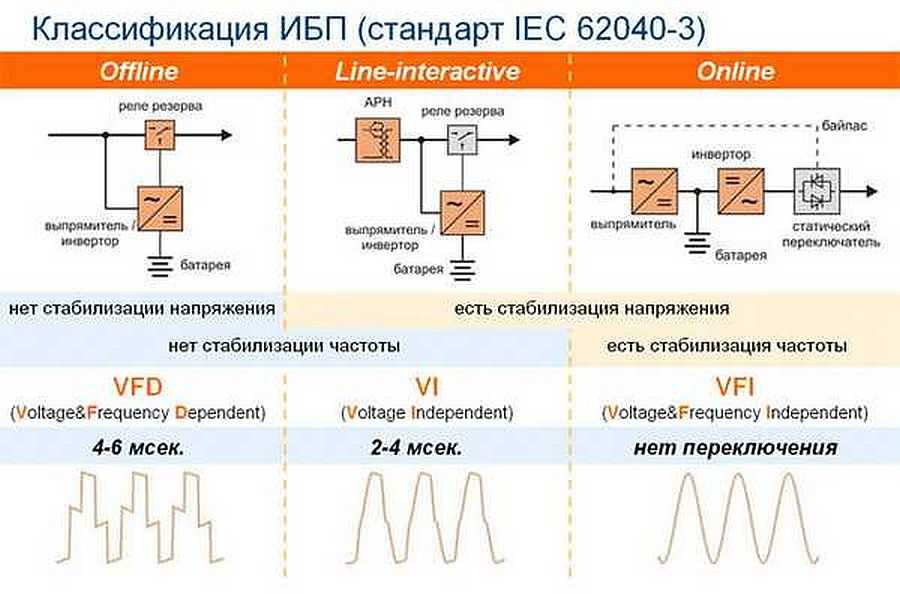
Types of UPS for gas boilers and block diagrams for their connection
Offline UPS (redundant type)
These are the simplest and cheapest uninterruptible power supplies. Off-line can be translated from English as “not in line”, which reflects the principle of operation of this device. In an uninterruptible device of this type, the upper and lower voltage limits are set, at which the boiler operates normally. As long as the network parameters are within these limits, power is supplied directly from the line.
If the voltage becomes more or less, the switching relay is activated, power is supplied through the UPS from the batteries. When the network parameters return to normal, the relay operates again, turning off the uninterruptible power supply. For a gas boiler, such protection is, of course, better than nothing, but when turned on / off, significant power surges are observed in the network. So the stabilization in this case is not complete - there are no big dips or peaks, but the supply voltage is far from ideal. The second disadvantage of offline uninterruptibles is that they cannot correct the shape of the sinusoid.

Therefore, off-line uninterruptible power supplies for gas boilers should be used only if you already have a stabilizer installed on a scrap or apartment. It produces an ideal voltage, and the UPS in this circuit simply connects the batteries in the absence of voltage. This scheme is expensive, but creates normal conditions for the operation of equipment that is demanding on the quality of the power supply.
On-line UPS (permanent type)
This type is also called uninterruptible power supply units with double conversion. All because of the principle of operation:
- Incoming input AC voltage converted to DC and used to charge the batteries connected to the device.
- The DC voltage is converted into AC with an ideal sine wave shape.
It turns out the power supply is converted twice. This guarantees voltage stabilization and an ideal sinusoid shape.

Online uninterruptible power supplies are connected to break the power circuit. While the voltage is normal, the linear power is converted, when the voltage is low, its deficiency is replenished by charging the batteries, in the absence of power supply is supplied from the battery.
The disadvantage of this equipment is the high price and rapid discharge of batteries, which is due to the fact that it is spent on straightening surges. However, if you need the best uninterruptible power supply for a gas boiler, buy online type equipment.
Line-Interactive (line-interactive)
The properties and characteristics of uninterruptible power supplies of this type are not as good as those of online models, but not as bad as those of offline units. There are all the same batteries and a switch that, when the voltage drops, connects the UPS. But to stabilize the voltage, there is a special unit - an automatic voltage regulator (AVR in the figure above).
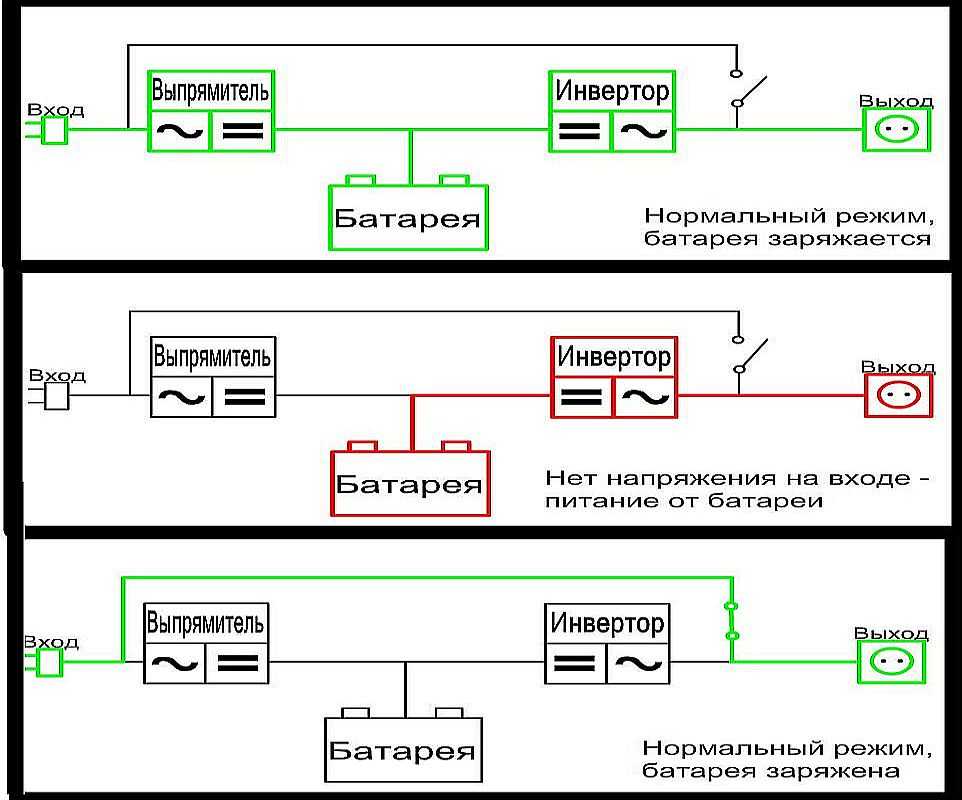
The disadvantage of line-interactive uninterruptible power supplies for a gas boiler is the non-instantaneous switching when the voltage changes. But it is much less than in offline devices, but the voltage is maintained constant (within certain limits). This equipment is the best choice, as it guarantees good results at a relatively low price.
UPS sizing
Determining what type of uninterruptible power supply for a gas boiler you need is not all. You need to know at least two more parameters: the power of the UPS and the capacity of the batteries that it can charge.
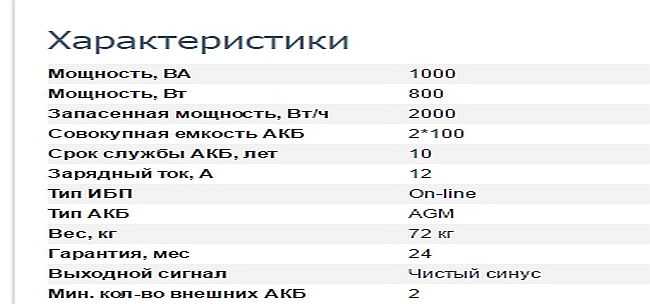
How to determine the power of an uninterruptible
To determine what power you need an uninterruptible power supply, look for the line “power consumption” in the gas boiler passport. On average, it is 150-170 watts. If there is a second circulation pump in the system, its power consumption must be added to this figure.

In order for everything to work without problems, a power margin of at least 20-30% is required. If possible, when choosing a UPS, the result can be doubled - just in case. Sooner or later, you will want to add a couple of devices to the load, as it is really convenient - when at least something works for you in the absence of electricity. This will be the minimum power of an uninterruptible power supply for a gas boiler.
Determining battery capacity
Many models of uninterruptible power supplies have built-in batteries. In this case, you don't need to count anything. If the batteries are connected separately, you need to find the line "maximum charge current" in the technical specifications. We multiply this figure not by 10, we get the capacity of the battery that this UPS can charge. You can connect larger batteries, but in this case they will not be fully charged, which reduces their service life.
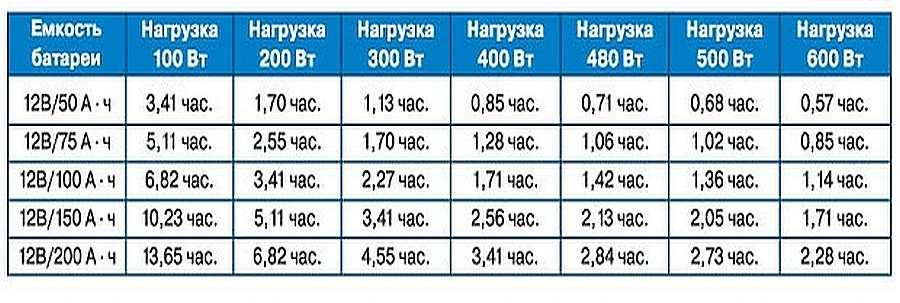
How to choose a UPS with built-in batteries? By the battery life you need. The dependence of the operating time on the battery capacity and power consumption is shown in the table. According to it, it is not difficult to select an uninterruptible power supply for a gas boiler.
Criteria for choosing a UPS for a gas boiler
From all of the above, we can deduce the following requirements for an uninterruptible power supply for a gas-fired boiler:
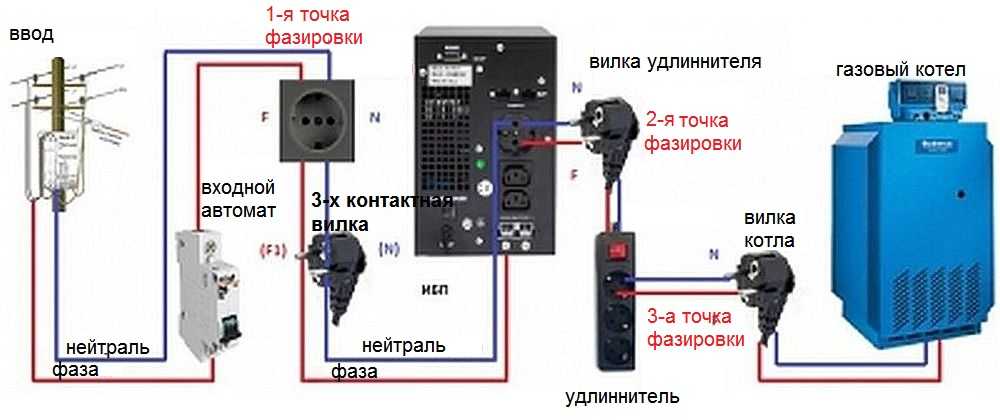
The requirements are not the most stringent, but it is desirable to adhere to them. When connecting an uninterruptible power supply, observe the phasing (the UPS phase must be connected to the boiler phase, zero and minus to the corresponding conductors). Otherwise, the boiler will not work. Checking the correctness of the phasing is simple: pull the boiler plug out of the network. The boiler must continue to operate. If the flame goes out - check the correct connection, the operability of the ground. If everything is normal, but the boiler still does not work, then your UPS is built without a "through zero". To start the boiler, you need to connect the N (zero) neutral terminals on the uninterruptible power supply at the input and output. For most boilers, this alteration solves the problem. But there are some brands of boilers, for example - Buderus (Buderus), which need to install resistance between the PE and N (ground and zero) inputs with a nominal value of 1 to 10 MΩ (Buderus even offers to buy their proprietary resistor).
Actually, this is all about choosing and even connecting an uninterruptible power supply for a gas boiler.
Modern gas water heating boilers are efficient and economical, but, unlike the old ones, they have a weak point. All new heating boilers are equipped with an automation system, and the system includes a circulation pump, requiring high-quality and uninterrupted power supply. Moreover, the boiler can shut down by internal protection when the mains voltage is low. If the problem of impulse noise and voltage drops can be solved by connecting the boiler and heating system equipment through a stabilizer, then in the event of a power outage, the stabilizer will no longer help - the automation will turn off the boiler, and it will be possible to start it only after the power supply appears. Turning off the heating system can be fatal to the entire system, especially in severe frost. And even if you do not have problems with power supply, no one is immune from the surprises of nature, line breaks and other emergencies. And low voltage in some settlements is almost the norm. Therefore, it is highly recommended to connect the gas heating boiler through an uninterruptible power supply - UPS (UPS).
It should be noted that an alternative to the UPS is an autonomous diesel or gasoline power plant. But it is advisable to use such autonomous power supply systems in conjunction with UPS, with large heated capacities and the possibility of installing such a generator. In the vast majority of cases, the optimal solution will be an uninterruptible power supply, correctly selected in terms of power and technical parameters. It will be much more profitable in terms of price, moreover, it does not require in-line fuel costs (gasoline, diesel fuel). And modern batteries in the UPS are enough for 10-15 years of operation. There is another option for an autonomous solar-powered power system - quite promising, but still a little expensive.
What you need to know when choosing an uninterruptible power supply (UPS) for a heating boiler?
We note right away that it will not work to connect a conventional car battery directly to a gas boiler, because the battery only produces a direct current of 12 V or 24 V. Therefore, to connect an autonomous power supply to the boiler, you need a device that converts the battery’s DC voltage to AC mains 220V . In addition, the conversion must be of sufficient quality (the shape of a sinusoid) to power the electronic components of the system. These devices are called an uninterruptible power supply, abbreviated UPS or UPS.
The functions of such devices are to invert the constant voltage from the battery to 220V alternating current in the absence of voltage in the network, stabilization of the output at 220 V, if there is a different input (for example, from 100 V to 300 V), Eliminate overvoltage surges, and also charge the battery if necessary. Such a device is fully automatic and provides a shockless transition to autonomous power without interrupting the power supply to the boiler and heating system. When power comes on, it automatically turns off the battery and switches to battery charging mode. Batteries are charged according to a certain algorithm, which can significantly increase the battery life.
But not all UPSs provide all of these features. There are two types of UPS:
The first type is an off-line UPS. Automatically switch battery power when there is a power outage and automatically charge the battery when needed. Those. if there is voltage in the network, the device is not involved in any way, the current flows through it in transit and, accordingly, does not stabilize. If the input is 180 V, then the output will be 180 V. The cheapest uninterruptible power supplies for a computer of this type. It is worth noting that switching power supplies for computers, TVs allow you to work normally in a wide range of input voltage (140V-250V, and a wider range). Gas boilers, in general, are much more demanding in this regard and can be switched off at a voltage of less than 190-200V. The instructions do not indicate this limit - look at the forums or ask the experts about the brand of your boiler.
The second type is an on-line UPS that are active all the time. The voltage in the on-line UPS is stabilized by double conversion inverter: First, the 220V AC voltage is converted to 12V or 24V DC, then the DC voltage is converted to 220V AC. Since the DC voltage of 12 V or 24 V is always stable, when this voltage is converted to AC 220 V, there are also no fluctuations, subsidence or voltage surges. As a result, the on-line UPS always gives a stable sine wave and voltage at the output. They also differ in the quality of the generated sinusoid. In addition, a UPS with a built-in voltage regulator allows you to provide a stable voltage to consumers without switching to battery mode. This allows you to significantly save battery life. The uninterruptible power supply with a double conversion voltage stabilizer is by far the most accurate and reliable, and unfortunately the most expensive.
A Few More Notes on Choosing a UPS for Your Heating System
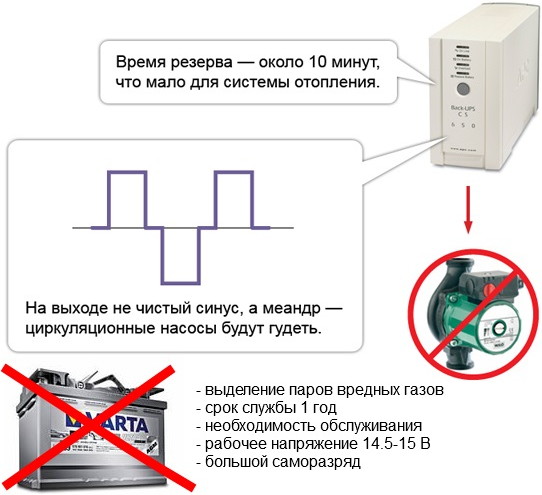
Inexpensive computer UPSs have a square wave output, which is unacceptable when running pumps, fans, and other inductive loads. To operate the boiler, a voltage with a pure sine wave at the input is required (ensuring smooth engine torque).
Starter batteries are designed to operate on short-term powerful loads (starter start), require maintenance and emit sulfuric acid vapors during operation (not allowed for use in enclosed spaces in close proximity to people). The average life of a car battery in a UPS system is less than one year.
How to calculate UPS power for gas boiler and heating system
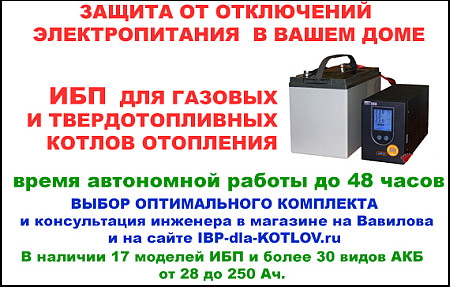
When choosing a UPS for a gas or other boiler, it should be noted that the output voltage of the uninterruptible power supply must be sinusoidal, since the boiler contains consumer devices that are critical to the shape of the input current (fan, circulation pump, gas valve, electronic unit).
Correctly calculated and selected uninterruptible power supply system for the boiler will avoid problems associated with turning off the boiler or its failure due to voltage drops, as well as ensuring its autonomous operation during the required estimated time.
In the classic version, the electrical power of the heating equipment (do not confuse it with heat) consists of the power consumption of the boiler itself and the circulation pump. You can take this data from the documentation or on the nameplates of the equipment.
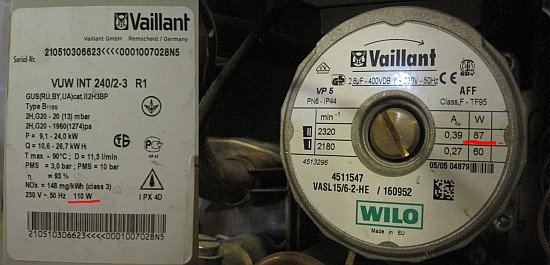
AT gas boilers up to 25 kW in terms of heat, as a rule, there is one pump. In more powerful, industrial boilers, there may be two or more pumps. In most cases, a boiler with one pump consumes 90-150W of electricity when the pump is on, and such a boiler needs a stabilizer or a UPS with a power of up to 300W. Accordingly, if two pumps are used in your heating system, then you need to take a UPS of at least 400-500W. In general, the power of the UPS should correspond to the total power of all devices powered by it. And do not forget also about the power reserve, at least 20-30%.
Obviously, the larger the battery capacity, the longer the battery life of the UPS. Approximate UPS uptime can be determined from the table below.
| Number / capacity of batteries | 1x12V / 60 Ah | 1x12V / 75 Ah | 1x12V / 100 Ah | 2 batteries x12V / 60 Ah | 2 batteries x12V / 75 Ah | 2 batteries x12V / 100 Ah |
| Load power, W | Working time, h | |||||
| 90 | 4,0 | 5,4 | 6,7 | 8,9 | 10,8 | 13,4 |
| 200 | 3,0 | 3,6 | 4,9 | 6,0 | 7,2 | 9,8 |
| 290 | 2,0 | 2,5 | 3,3 | 4,0 | 5,0 | 6,6 |
| 400 | 1,4 | 1,8 | 2,4 | 2,8 | 3,6 | 4,8 |
| 500 | 1,0 | 1,4 | 1,5 | 2,0 | 2,8 | 3,0 |
Another important indicator for a UPS, this is the power of the charger. As you know, the larger the battery capacity, the more current is needed to fully charge the battery. The approximate ratio is 1 to 10. Ie. to charge a battery with a capacity of 60 A / h, a charge current of 6A is required. You can also charge with high currents, but this leads to rapid battery wear. If the charge current is less than it should be, then the battery will not be recharged, as a result of which it will "coke" ( technical term- sulfatization), which will also lead to a decrease in service life.
Uninterruptible Power Supply Run Time Calculation
Simplified formula
The calculation of battery life can be carried out using a simplified formula. To do this: The battery capacity in Amp-hours, multiply by the battery voltage, in volts, divide by the constant load in watts and get = Number of hours of continuous battery life.
For example, a boiler that consumes 180 V with a 50 Ah battery will continuously operate for 3.3 hours (50*12/180).
Refined calculation
If you decide to delve into specifications UPS and independently calculate the time of continuous autonomous operation of your boiler and heating system - please! To make a calculation, we will use the only correct method, but for this you need to know not only the power of the boiler, but also several important parameters of the UPS for the boiler:
T- UPS battery life when the network is turned off, h;
Uab- voltage of one storage battery, V;
sak- battery capacity, A * h;
To- the number of batteries in the battery;
h- Converter efficiency (h=0.75-0.8);
Cr- coefficient of depth of discharge 0.8 -0.9 (80% -90%);
Kg- coefficient of available capacity, depends on the discharge mode and temperature:
- with a one-hour discharge mode, tamb=20°C 0.7 (70%)
- with a two-hour discharge mode, tamb=20°C 0.85 (85%)
- with a ten-hour discharge mode, tcr=20°C 1.0(100%);
T \u003d Uab * Sak * K * h * Kr * Kg / Rload
where Rnagr - load power.
To take a closer look calculation of an uninterruptible power supply for a boiler let's substitute the approximate values:
Uab = 12 V;
Sak \u003d 84 A * h;
K = 1.0;
h = 0.8;
Kp = 0.9;
Kg = 1.0.
Pload = 150 VA.
T = 12 x 84 x 1.0 x 0.8 x 0.9 x 1.0 / 150 ≈ 4.84 hours
Thus, if your heating boiler has a capacity of 150 VA and is powered by an uninterruptible power supply with a battery with a capacity of 84A * h at 12V, then the battery life will be 4.84 hours.
What is the best selling boiler UPS?
Based on the most requested initial data, the most common UPS configuration for a boiler is a double conversion UPS (it has a constant, stable output voltage), an operating power of 300W and a short-term peak load of up to 1000W.
What is the best battery for a boiler?
The best price / quality ratio has a 12V 100A battery. The difference in cost between batteries of 50 amperes and 100 amperes is only 30-40%, and between batteries of 100 amperes and 120 amperes is already about 50%. Thus, as one or more backup batteries, it makes sense to look towards the 12V 100A battery.
These are reference data, and it will not be difficult for you to determine the required UPS parameters for a particular boiler and heating system using any formula, and according to the known parameters, you will already choose the UPS model - there are quite a lot of them on the market now, as they say for every pocket and taste.
The popularity of cottage settlements and, in particular, country houses could surpass the demand for urban housing, but this is largely hampered by problems of electricity supply and gasification. Ownership of a private house, the engineering and communication content of which depends on the quality of the central network, often turns into continuous torment for the owners. The only way out is to use standalone home maintenance equipment. In these realities, the popularity of UPS for gas boilers is steadily growing. User reviews highlight many positive aspects in the operation of such equipment. For example, there is a high potential for MTBF, minimal maintenance requirements, as well as the economy and availability of the installation. However, a lot depends on the specific unit, so the main backlog in the use of a gas boiler with a UPS should be provided at the time of purchase, making the right choice.
What is a UPS?
Outwardly, the device resembles a massive block, which is installed near the boiler or other heating unit. From a functional point of view, the UPS design contains two modules. The main one is the stabilizer, which provides the immediate task of the equipment - the normalization of the power supply. The second module is represented by a rechargeable battery, which, in turn, maintains the operating state of the entire unit. There can be several batteries or one - it depends on the power of the unit. It must be said right away that batteries for UPS gas boilers are very important elements that not only feed the main source of energy, but are also able to disable it. This usually happens if inappropriate car batteries. If the unit is properly equipped and correctly connected, then the owner can count on a stable AC frequency and protection of the boiler from voltage surges. Also, UPS can be equipped with additional options, but first things first. 
Primary characteristics of the UPS
Despite the high responsibility of the home boiler house, there are only two main selection criteria: this is the time period during which the unit will have to provide its support, and power. In this case, the power should be considered not as thermal, but as electrical - that is, the one that is required for the operation of automation and equipment pumps. The maximum limit of this indicator rarely exceeds 400 W, but there are exceptions, so you should initially find out the power in the equipment passport. Modern UPSs are able to provide it at the level of 3000-5000 watts. Of course, for a 400-horsepower unit, this volume is not required, and models with 500-700 watts will be the best options.
Next, you should decide on the time interval. To understand how to choose a UPS for a gas boiler according to this criterion, it is necessary to take into account the battery capacity and load power. Reducing the power and increasing the volume of the battery contribute to an increase in the autonomous operation of the boiler. It would seem that it is enough to immediately focus on a large capacity that can ensure long-term operation of the boiler. But there is one caveat - in this case, the operation of the equipment will entail high financial expenses. Therefore, it is better to calculate in advance the interval of inactivity of the main network closest to the maximum limit and select a specific UPS model for it.
UPS types
From the point of view of the principle of operation, devices can be divided into three categories: line-interactive models, redundant type sources and On-line modifications, which are considered the most efficient UPS for a suitable option from the types described above? The answer to this question depends on the requirements for heating equipment. Line-interactive devices are distinguished by the ability to independently ensure the operation of the boiler for 15-20 minutes, however, they are equipped with a simple stabilizer, which is not suitable for servicing powerful units. Backup models are even simpler - they do not have a stabilizer, so you can use such a source only for equipment operating in conditions of reliable network operation. On-line models are considered the most reliable, functional and productive, as they are equipped with high-precision stabilizers, the operation of which can be supplemented by several batteries.

Reviews of Helior products
The manufacturer produces good models of the budget segment, with the help of which it is possible to ensure a short, but stable operation of a boiler with a power of about 500 watts. Of greatest interest is the Helior Sigma 1 KSL model - this is a UPS for gas boilers, reviews of which note compact dimensions and ease of installation, as well as a large Russian-language display. However, there are complaints about the fact that the battery charge is displayed inaccurately. This option attracts primarily those who do not have the opportunity to seriously invest in such equipment. The cost of this model varies from 17 to 20 thousand rubles. For this money, the buyer gets the opportunity to ensure a 13-hour operation of a 100 W gas boiler, or a 2-hour operation of a 500 W unit.
Reviews of Zenon models
From the Zenon brand, it is worth offering a good solution in the form of a modification of 1000LT-24. This option is praised not only by the inhabitants, but also by the server room staff, medical institutions, heating complexes, etc. Being approximately the same price category with the previous model, this option is able to provide even more autonomy. In particular, this is facilitated by the fact that the device belongs to On-line models. These are the most advanced UPS for gas boilers, reviews of which indicate the ability to instantly switch from mains power to battery. This effect is achieved by double conversion. The device can be used for boilers whose power does not exceed 800 watts. At the same time, for a 100-horsepower unit, such a UPS can provide autonomy for 35 hours, and in the case of a 500-watt boiler, about 5 hours.
Reviews about Tieber models
Models of this brand, namely the T2000 48V version, are more suitable for consumers who use high-power boilers. Or those users who plan to “eat” only from the UPS for a long time. Owners note a high degree of autonomy.

So, for example, for a 100 W boiler, this device can extend the operation by 160 hours. But it is important to consider that this is a double conversion UPS for gas boilers that requires 4 batteries. That is, it is necessary to prepare for the rather costly maintenance of heating equipment. However, in terms of reliability and performance, this option more than justifies itself. The owners characterize the operation of the source as stable and "omnivorous". This means that the device ensures the full functioning of the most demanding and capricious boilers in operation.
Reviews of East models
The manufacturer focuses its products on the solution difficult tasks. For example, for a 6-day autonomy of a 100 W boiler. The package of this equipment already includes 6 batteries, which, again, indicates a high potential. So, the EA930 version has a power of 2700 watts. In terms of functionality, this is one of the most profitable UPS for gas boilers. Reviews, for example, note that the source is able to work correctly with phase-dependent boilers, which cannot be achieved using budget UPSs. Also among the advantages it is worth noting the tightness of the device, which guarantees stable performance without third-party interference.
What else to consider when choosing?
Not all sources provide the so-called pure sine during operation. High-quality devices, as a rule, with double conversion, fulfill this condition not only when operating on a battery, but also under supply from the central network. It is also necessary to distinguish between models designed for short-term support of network parameters and "long-playing" versions of the UPS.
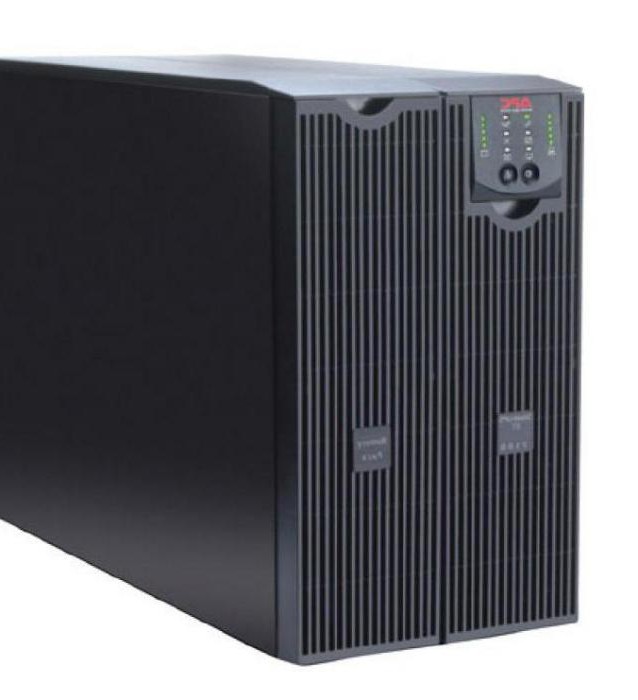
Energy for gas boilers from sources of the LT (long time) system is able to provide long-term autonomy due to a high-power intelligent charging cell. It will also not be out of place to take into account the dimensions of the device and its interface - nevertheless, ergonomics in our time plays an important role, and many manufacturers strive to facilitate the tasks of users even in small things.
How to choose a battery?
In addition to capacity and voltage, that is, the parameters that are the main ones when choosing a battery for a UPS, you should pay attention to the service life and physical characteristics. For the simplest devices serving low-power equipment, 12 V lead-acid maintenance-free models are suitable. However, modern batteries for gas boiler UPSs are mainly made using AGM technology. This means that an absorbent separator based on glass wool was used in their manufacture. If you need a reliable and safe battery, then you should look at these options. In addition to the fact that AGM batteries are presented in different versions and differ in volume with voltage indicators, their advantage is the absence of harmful fumes, as well as fire safety.
Is it possible to make a UPS with your own hands?
Self-made power supplies of this type are a reality, however, it should be borne in mind that their performance will be lower than factory counterparts, and the dimensions, on the contrary, are larger. We are not talking about reliability at all, however, sometimes it is advisable to use just such UPSs for a gas boiler. With your own hands, the device can be assembled from a block of pulses with inverters. It is advisable to purchase equipment with a capacity of 28 V, which will allow you to connect without adapters. For cooling, it is better to use not fans, but radiators, especially if a powerful stabilizer is used. The inverter is also sold separately. The best option- a device with a modified sinusoid. During operation, such a unit must be regularly checked for oxidation of compounds and treated with special compounds.
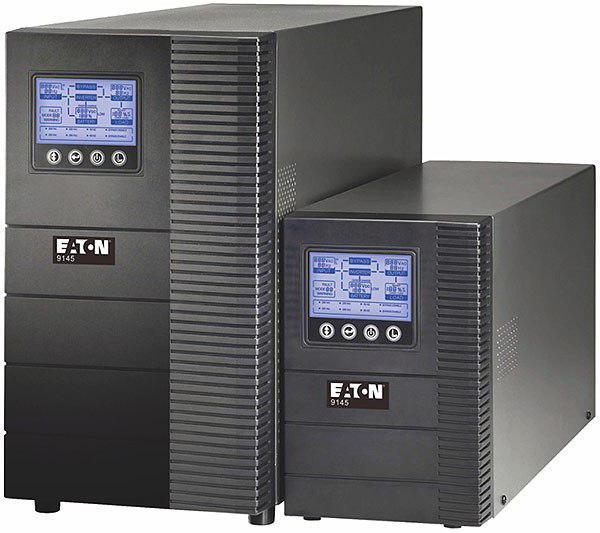
Connection order
The equipment should be installed in a room protected from mechanical influences with optimal humidity and temperature conditions. It is worth planning in advance the configuration of the location of the device, since you can also purchase a wall-mounted UPS for a gas boiler, and its analogue of a floor type. In any case, the connection is made according to the following instructions:
- The UPS is connected in series with the batteries using jumpers (one or more, depending on the number of batteries).
- Batteries can be placed anywhere near the UPS, but in such a way that the case of the latter does not short-circuit the battery terminals.
- Now you can connect the UPS to the outlet, but it is important to consider that it must be grounded.
- Connecting and starting the load.
In this case, the choice of those working on gas fuel is considered. The fact is that such equipment can be phase-dependent. That is, if the connection of the UPS to the gas boiler did not lead to the ignition of the burner, then it is necessary to unfold the plug and turn it on again. Turning the fork 180 degrees will usually fix the problem.
The very concept of uninterruptible power supplies requires a high degree of reliability. However, only appropriate operating rules will allow extending their service life. In particular, manufacturers recommend that, even if there is a main power supply, preventive sessions of the boiler operation from a UPS are recommended. It is advisable to perform this procedure twice a year for 2-3 hours. also in summer time if the heating unit is not to be used, then the backup supply must be switched off. To do this, the network cable is removed from the device, and the device itself is turned off by pressing the two OFF buttons simultaneously.
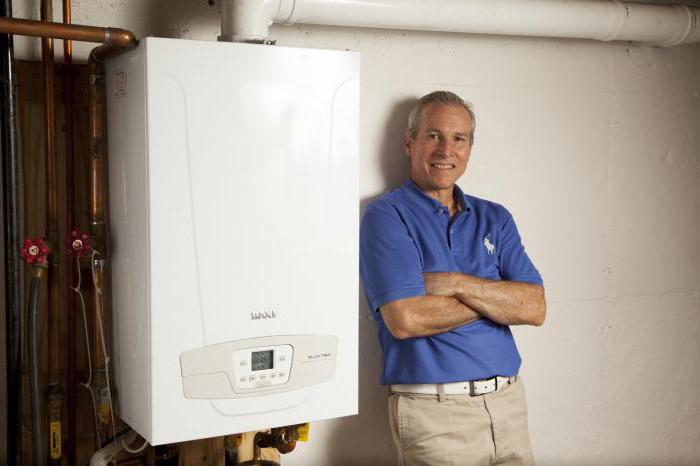
Conclusion
From the acquisition of auxiliary equipment for the maintenance of heating systems, many refuse for the reason that inevitably grow financial expenses for the maintenance of the infrastructure being formed. In this regard, of course, the best UPS for a gas boiler should be selected according to the principle of economy. But this does not mean that the device should be equipped with low-power batteries with a minimum volume. Rationality in this case means the maximum proximity of the device to the requirements of technical support for autonomous operation. To do this, the power of the boiler itself is calculated and the average time for which the power supply can be turned off is determined.



